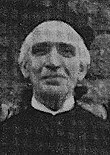Nicolas Pietkin
Nicolas Pietkin (born December 6, 1849 in Malmedy ; † January 9, 1921 there ) was a Belgian priest and Walloon activist.
Life
As a result of the Congress of Vienna , the area of the Imperial Abbey of Stablo-Malmedy was cut into two parts, with the borders of the dioceses of Liège and Cologne being used as the dividing line. Initially, the Walloons of Malmedy, which was now part of Prussia , had great freedom in terms of language and religion. Pietkin studied at the colleges of Malmedy and Neuss as well as at the University of Bonn . He was ordained a priest in Cologne in 1875.
In order to avoid the effects of the Kulturkampf triggered by Otto von Bismarck , he withdrew from the Prussian Wallonia and worked as a tutor in various families in Belgium and France. He later decided to return to his homeland to promote the preservation of the French language there. He was appointed preacher in Sourbrodt by the Archbishop of Cologne in 1879 to support an old priest, and he initially served as the church's preacher before being appointed administrator of the parish in 1884 and a priest in 1889.
Like the other priests in the region, he delivered his sermons, the catechism and the songs in French in order to oppose the official policy of Germanization, but without excluding his German-speaking parishioners, especially those from the nearby Elsenborn camp . When the pressure against the French language increased, he went to Wallonia. In 1904 he published an article on the Germanization of Prussian Wallonia in the journal Wallonia de Liège .
On August 10, 1914, shortly after the outbreak of the First World War , he was arrested by the Germans and imprisoned for several days because of his Francophile and Walloon sympathies.
Appreciation

The Assemblée Wallonne decided to erect a memorial for him after issuing a statement acknowledging:
- “A nation that does not thank those who defended it is a dying nation. But the Walloons will never forget that Abbé Pietkin refused the honors and preventions offered by the enemy in order to better defend our sacred Walloon cause ... Malmedy, the birthplace of the deceased hero, in accordance with the The Walloon Assembly and the Walloon National Union are preparing to erect a monument to the noblest of their sons that is worthy of him. "
The seven meter high monument, designed by Georges Petit, represents the lioness with Romulus and Remus as a symbol of Latin civilization. In the lower part of the monument, adorned with a cross and surrounded by oak and laurel wreaths, it shows a medallion 1 meter in diameter Pietkin's features. The stele was inaugurated on October 3, 1926 with great interest. Part of the clergy protested against the design of the monument and its pagan character. On an initiative of Father Toussaint published in La Libre Belgique and La Gazette de Liège , a demonstration was even organized against the two Romans who are suckled by the she-wolf, whereupon several members of the Malmedian clergy resign.
During the Second World War , the monument was damaged in the winter of 1940 by Nazi-friendly residents of the region. It was restored after the war and consecrated again on June 2, 1957.
Trivia
The taverns and the increasing prostitution at the train station in Sourbrodt displeased Reverend Pietkin when he warned from the pulpit with the following pun of the bad luck of the field railway of the military training area Elsenborn : “C'est le chemin de l'enfer!” (“That is the Train to hell! ")
Individual evidence
- ↑ La germanization de la Wallonie prussienne. In: La Vie Wallonne, No. 6 of February 15, 1921, 28 pages.
- ^ Encyclopédie du Mouvement wallon, Volume III, p. 1270.
- ↑ Roland Ferrier: Quelques figures ecclésiastiques du mouvement wallon. In: Église et Wallonie Volume I, EVO, Brussels, 1983, p. 88.
- Jump up at Sourbrodt station. In: The train is coming ... History and Museum Association between Venn and Schneifel, accessed on March 29, 2019 (abbreviated from: Echo de Malmedy, May 5, 1889, based on templates by R. Giet, Sourbrodt).
| personal data | |
|---|---|
| SURNAME | Pietkin, Nicolas |
| BRIEF DESCRIPTION | Priest and Walloon activist |
| DATE OF BIRTH | December 6, 1849 |
| PLACE OF BIRTH | Malmedy |
| DATE OF DEATH | January 9, 1921 |
| Place of death | Malmedy |
